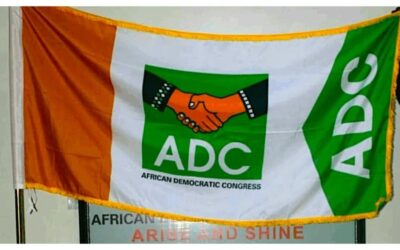Yinka Odumakin: Light Dims for Activist With Deep Convictions
It was with a blend of disbelief and apprehension that Nigerians received the news of the death of Yinka Odumakin, the National Publicity Secretary of the pan-Yoruba group, Afenifere. As Mike Ozekhome said and as others reasoned, Odumakin’s death had to be an April Fool Day prank. The jolting nature of the news is better captured in the expression of APC National Leader, Asiwaju Ahmed Bola Tinubu, and Vice President, Yemi Osinbajo, who said the death of the Afenifere leader was a heavy shocker.
Odumakin was reported to have died at the Lagos State University Teaching Hospital COVID Isolation Centre. His wife, Mrs. Joe Okei-Odumakin, who said a part of her was gone, confirmed this on 3 April 2021. According to her, Odumakin died from respiratory issues due to complications from COVID-19 which he had recovered from about a week ago.
The death of the renowned Yoruba leader has elicited responses from several quarters. President Buhari, a man he staunchly criticized over the years, commiserated with his family and Afenifere, while describing him as a man of conviction. In all the tributes on his death, no one succinctly captures Yinka Odumakin’s human rights advocacy and political activism than those of the President.
Odumakin was Buhari’s spokesperson when he ran for president under the platform of Congress for Progressive Change. He wasn’t a critic that could be swayed. He was the type that reveals and stand by anything he believed. This can be seen in the early years of his sojourn in the political space.
Yinka Odumakin kicked off as an activist when he was in school at Obafemi Awolowo University. Apart from holding the position as a Public Relations Officer of the school’s student union, he was a core member of the Democratic Socialist Movement (DSM).
He played a major role in the National Democratic Coalition that fought the regime of late military head of state, General Sani Abacha, after the annulment of the June 12, 1993 election. Married to a fellow rights activist, Joe, in 1997, Odumakin’s voice was heard through the dark years of military despotism. He as a matter of fact met his wife during the military junta of Abacha. They met at a detention facility in Alagbon where she was transferred from Ilorin, Kwara State. His wife, on the one hand, was arrested following some of her pro-democracy campaigns. Describing his wife, Odumakin said, “I had read the name in the newspapers before then, but I thought the person was a man.”
Odumakin, on the other hand, was arrested alongside late Chief Gani Fawehinmi and two others at a rally in Lagos. In spite of the numerous mortifications he faced during the military era, Odumakin wasn’t deterred. He was a supporter of MKO Abiola whose victory in 1993, June 12 elections he described as “the day Nigerians from all walks of life came together, setting aside primordial sentiments, to elect Abiola as their president for a united country. It was a day when Abiola, with a Muslim/Muslim ticket, won with a majority vote in Christian areas. That was the day a genuine attempt was made to remake Nigeria.”
Yinka Odumakin’s activism knew no friend or foe. His feud with the All Progressive Congress (APC)’s national leader, Asiwaju Bola Ahmed Tinubu, is an attestation. He and Tinubu were allies in the NADECO days, but their relationship went sour. The Afenifere leader had accused his former counterpart of being with NADECO during the day but at night jumping “to bed with Abacha through whom you forged a friendship with the Chagourys who are your business partners till date.”
He extended his detest for his enemies to friends of his enemies. He had once attacked popular Nigerian pastor, Tunde Bakare for identifying with Tinubu. In a column he wrote for the Nigerian Tribune, he stated that “it is the very height of the abuse of the rostrum for a pastor to say to us no matter how God-forsaken the country has become that if somebody is accused of being a thief, the rest of us should go and become thieves as well.”
Odumakin lampooned the one-time presidential running mate of Buhari for “placing the worship of man momentarily over the worship of God.”
As Afenifere spokesman, Odumakin spoke doggedly for the rights of the Yoruba and the people of the South-West geopolitical zone. Just before his death, he consistently condemned the activities of criminal herdsmen, who had been accused of farmland destruction, rape, killings, and abductions in the South-West.
Read Also: Nigerians Who Support and Incite Violence: Yinka Odumakin and Gov. Samuel Ortom
The late Afenifere spokesman, amongst other things, was a strong proponent of the ideas of restructuring, fiscal federalism, and decentralised policing as solutions to the country’s socio-economic challenges. Those who opposed restructuring were beneficiaries from what he described as the “failed arrangement which favours few against the majority.”
Speaking further in an interview in 2019, he said that “there are two options for Nigeria: to reset and go back to what our founding fathers agreed. When we do this, there is a chance for Nigeria to survive. But if we continue the way we are going, there would be disintegration.”
Some of his critics had questioned his activism, describing him as a cash-and-carry activist who is always supporting where he gets something in return. Odumakin challenged them to “just bring one person who can say that I ever asked him for money to defend any cause in my life. Let them bring out just one person that can say that. If they are able to bring out one person who can say that, you will never hear me say anything in this country again.”
Yinka Odumakin might have come out as overly vociferous in his activism and the radicalism of his approach to certain issues, but deep down all he desired for himself and others was a better society. This is as he puts it while noting that “I will not even say I am a human rights activist. I desire a better society where I can live, and where others can also live.”
Nelson Okoh


